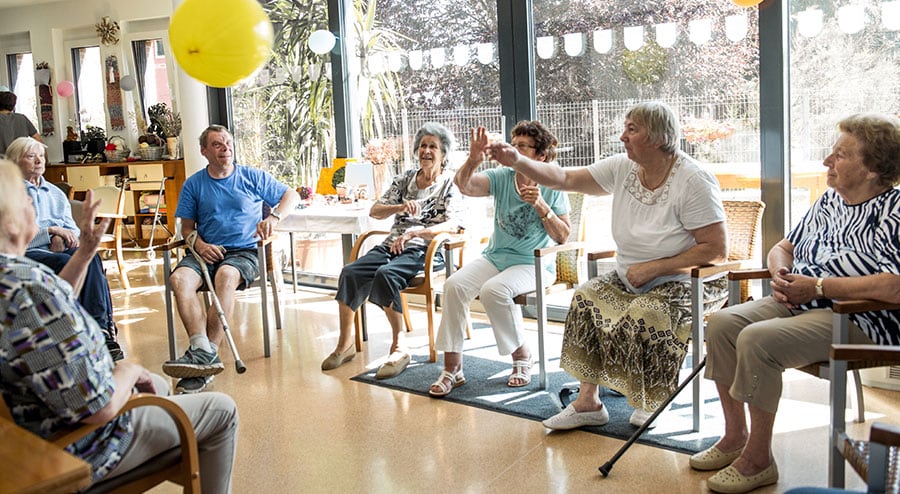Aided Living: a Compassionate Setting for Seniors With Memory Obstacles
By providing customized treatment and structured regimens, these neighborhoods not only enhance cognitive feature however likewise foster emotional links, decreasing isolation among residents. The efficiency of these treatments typically pivots on the involvement of households in the treatment process, motivating a closer evaluation of just how this collaborative initiative affects outcomes for both citizens and enjoyed ones.
Understanding Memory Difficulties
Recognizing memory challenges is necessary for giving effective care to elders facing cognitive decline. Memory disabilities, which can show up as lapse of memory, confusion, or problem recalling current occasions, are often signs and symptoms of conditions such as Alzheimer's condition or various other forms of mental deterioration. These challenges can significantly affect an elderly's ability to carry out daily tasks, maintain social partnerships, and manage individual safety.
Acknowledging the different phases of cognitive decrease is critical for caretakers and medical care professionals. Early-stage amnesia may involve mild forgetfulness, while mid-stage decline can lead to much more pronounced disorientation and confusion. In late-stage dementia, individuals might shed the capability to interact successfully, needing detailed assistance and understanding from caregivers.
Furthermore, memory difficulties can evoke a range of emotional responses, consisting of irritation, anxiety, and anxiety. This requires a caring method to care that focuses on the psychological well-being of the individual. Understanding the intricacies of memory challenges enables caregivers to produce customized methods that boost interaction, promote interaction, and offer a complacency. Inevitably, a deep understanding of these obstacles is essential to delivering thoughtful and efficient look after seniors encountering cognitive decline.
Benefits of Assisted Living
Aided living offers numerous advantages for elders with memory difficulties, providing a helpful environment that cultivates independence while making certain security and treatment. One of the main benefits is the day-and-night supervision and aid offered, which aids alleviate threats connected with memory-related concerns. Assisted Living. This consistent support enables elders to take part in everyday tasks without the anxiety of crashes or confusion
In addition, assisted living centers commonly offer structured regimens that can enhance cognitive feature and security. These routines aid residents feel even more secure and minimize anxiousness, as they recognize what to expect every day. Social communication is another considerable advantage, as these settings encourage connections amongst homeowners, advertising emotional wellness and lowering feelings of isolation.
Additionally, aided living staff are trained to acknowledge the special demands of elders with memory challenges, allowing for customized treatment strategies that resolve individual preferences and demands. This tailored technique not just boosts the top quality of treatment yet also empowers seniors to maintain a sense of freedom. In general, assisted living functions as a caring solution, balancing the requirement for assistance with the desire click over here now for independence in the lives of seniors facing memory challenges.
Specialized Care Approaches
Executing specialized care methods is vital for successfully supporting senior citizens with memory challenges. These customized approaches focus on improving the high quality of life and cultivating freedom while addressing the distinct requirements of individuals with cognitive impairments. One basic technique is person-centered treatment, which emphasizes the importance of recognizing each homeowner's biography, preferences, and values. By tailoring treatment strategies appropriately, staff can create an extra appealing and meaningful environment.
One more crucial technique includes utilizing cognitive stimulation therapies. Tasks developed to improve memory recall, encourage social communication, and promote psychological agility can dramatically influence citizens' overall wellness. Techniques such as memory therapy leverage individual memories to stimulate conversation and connection, while songs therapy can evoke emotions and memories, providing convenience.

Producing a Supportive Area
(Dementia Care Charlotte)A helpful community plays a crucial role in boosting the lives of senior citizens with memory obstacles. Such a community cultivates an environment of understanding, empathy, and encouragement, which is important for people facing cognitive problems. By developing a network of support, helped living centers can considerably boost the quality of life for homeowners.
Central to a supportive neighborhood is the visibility of trained personnel that are delicate to the unique requirements of elders with memory impairments. These professionals not only supply essential care however additionally involve residents in significant activities that promote cognitive feature and advertise social interaction. Programs that encourage involvement in team workouts, arts and crafts, or memory video games can boost both physical and mental well-being.
Furthermore, a helpful area advertises solid links amongst residents. Encouraging friendships and peer assistance aids to lower sensations of seclusion and fosters a feeling of belonging. Regular social events and communal dining experiences can even more strengthen these bonds, producing an environment where senior citizens feel valued and comprehended.
Involving Households in Care
Engaging households in the care process is essential for providing comprehensive support to senior citizens with memory challenges. Family members often offer as essential supporters, using insights into the individual's choices, background, and routines that can boost tailored treatment. By including them in discussions and care planning, assisted living centers can produce a more all natural method that resonates with the homeowner's requirements.

Motivating families to take part in care not only improves the health of the senior yet also supplies emotional support to household participants. Including family members in care cultivates a feeling of area and belonging, ensuring that seniors feel linked to their loved ones. Ultimately, a collaborative method to care enhances the lives of both homeowners and their family members, creating a compassionate and supportive environment that promotes dignity and respect.
Conclusion
In final thought, helped living offers as a crucial source for senior citizens experiencing memory difficulties, using customized treatment tailored to private requirements. By involving families in the care process, helped living produces an extensive assistance network, inevitably enhancing the lives of citizens and their liked ones.